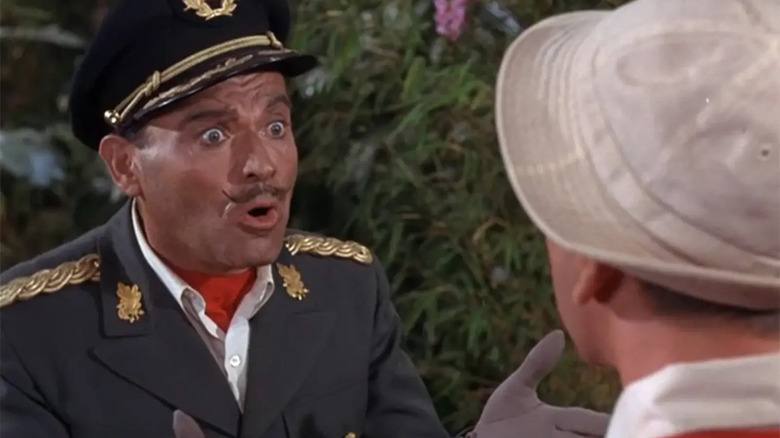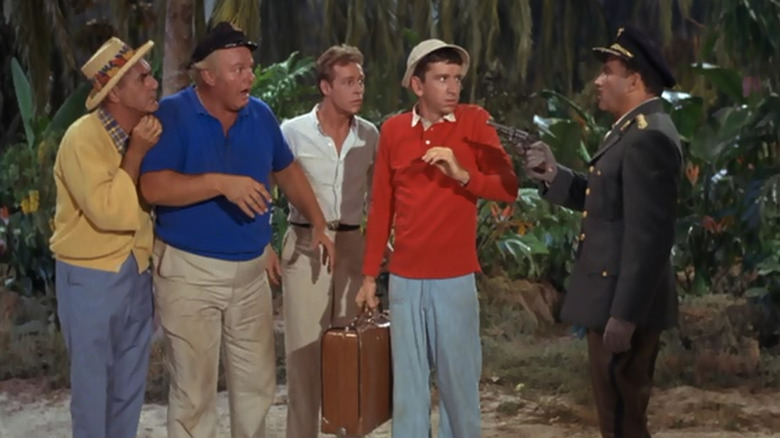Gilligan's Island Creator Sherwood Schwartz's Favorite Episode Was Also The 'Most Meaningful'
We may receive a commission on purchases made from links.
In Paul A. Cantor's 2001 book "Gilligan Unbound: Pop Culture in the Age of Globalization," the author posited that Sherwood Schwartz's celebrated-and-lambasted-in-equal-measure 1964 sitcom "Gilligan's Island" stood as a symbol of America's indomitable confidence in its post-War, Baby Boom period. One could, "Gilligan's" argued, place a random assortment of seven Americans in whatever isolated locale you wanted, and they would essentially form a pleasant democracy. The seven stranded castaways of "Gilligan's Island" might have bickered, but they never went to war. Instead, several distinct American classes came together. The ultra wealthy (Jim Backus and Natalie Schafer's Howells) hobnobbed with a farmer (Dawn Wells' Mary Ann). The intelligentsia (Russell Johnson's Professor) got along perfectly well with the Hollywood elite (Tina Louise's Ginger), and they were all held together by a gentle military hand (Alan Hale's Skipper). Gilligan, meanwhile, was the ultimate Everyman, able to serve as an amalgam of them all.
While Cantor's book is an interpretation, it seems that he was spot-on with his analysis. In an opinion piece Cantor wrote for the Washington Post in 2011 – written immediately after Schwartz's death at the age of 92 — he revealed that he had several conversations with Schwartz about the meaning of "Gilligan's Island," and how it was much more than the silly trifle it was often described as. Indeed, according to Cantor, Schwartz intended for "Gilligan's Island" to be a microcosm of American democracy at its most idealized. Indeed, Schwartz was often miffed that writing about "Gilligan's Island" tended to focus on the show's silliness, rather than recognizing its thematic underpinnings as they connected to American exceptionalism.
With that in mind, Schwartz felt that the best and otherwise "most meaningful" episode of the series was "The Little Dictator" (September 30, 1965), an episode about a deposed tyrant that washed up on shore. According to Cantor's opinion piece, Schwartz loved the episode as it served as an example of how democracy can go wrong.
Schwartz felt The Little Dictator made the themes of Gilligan's Island perfectly clear
In "The Little Dictator," a South American military fascist named Rodriguez (Nehemiah Persoff, who also starred in a famous season 1 episode of "The Twilight Zone") is sent to the castaways' island after being ousted from his rulership. He instantly announces that he will rule over the seven stranded castaways with an iron fist. The castaways aren't terribly afraid, however, as he has no bullets in his gun. In an inspirational move, the castaways offer to welcome Rodriguez into their homes, making him the eighth castaway.
Rodriguez claims to accept their offer, but secretly has plans to install Gilligan as the island's ruler, with Rodriguez manipulating the boob from behind the scene. Thanks to a prescient dream, however, Gilligan realizes that he is a mere puppet and ultimately rejects Rodriguez. In a rapid series of twists, Rodriguez is rescued from the island by his fellow countrymen. It seems there was a counter-revolution, so Rodriguez returns to be re-installed as dictator. He leaves the island on a small boat (naturally, too small to accommodate any of the other castaways) and returns home.
Over the radio, the castaways learn that Rodriguez was indeed re-installed, but was then re-ousted again after telling his country about Gilligan. They all assume he's no longer of sound mind, as someone as clueless as Gilligan couldn't possibly exist. Rodriguez, the report continues, has been exiled a second time, this time to a remote location in the Andes. Hope comes, hope goes. Sunrise. Sunset.
Schwartz said he was particularly proud of the dream sequence, feeling it made the central themes of the show — that it's fundamentally about the positive power of American democracy — abundantly clear. To Schwartz's consternation, it still went unobserved. In his own words:
"Not a single critic got it, with the basic concept of democracy staring them right in the face. [...] I never thought I'd see the day when an English Professor of some note would use 'Gilligan's Island' as one of four pillars on which rest the liberal democratic view of the recent past in America."
Cantor, meanwhile, was happy to have "got it."

